
|
Film Kisses of All Time in Cinematic History 1944-1946 |
![]()
| Film Title/Year and Description of Kiss in Movie Scene | |||||||||||
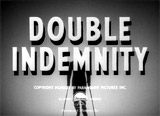
|
One of the greatest film noirs of all time was Paramount's and director Billy Wilder's film, based upon James M. Cain's novel. It told of a sizzling relationship that developed between two murderous conspirators:
She appeared at the door of Neff's darkly-lit apartment, on the pretense of returning his hat from earlier that afternoon. She peeled off her coat, and was revealed to be wearing a very tight, form-fitting white sweater designed to entice him. By the wet window pane, Phyllis related more about the suffocating relationship she had in her marriage. But as she drifted away from him to leave, he grabbed her by the wrist and kissed her, feverishly telling her:
Back in the living room with their drinks, Phyllis again explained about being trapped in a loveless marriage to her domineering and mean husband Dietrichson (Tom Powers) (his second marriage). She was unable to convince the hateful Mr. Dietrichson to grant her a divorce. She married him out of pity after the death of his first wife (who was sick for a long time), when she served as the wife's nurse. Phyllis imagined killing her husband in an enclosed garage by carbon monoxide poisoning. Phyllis cried about her predicament as he held her on the sofa. He put his arms around her and told her: "And I don't want you to hang, baby. Stop thinking about it, will ya?" But Neff admitted that he was taken by her teary-eyed seductiveness, in a flash-forward. The scene tracked/dissolved back to Walter's apartment, the same evening, where Neff reclined on the sofa smoking a cigarette, and Phyllis was fixing her makeup - presumably after they had sex. She expressed her disdain about returning to her husband. He had decided to join her in scheming to kill her husband and help her make it look like an accident - to collect on her husband's accident insurance policy:
He told her that they were going to do it with a brilliant, scheming plot. He grabbed her tightly and dug his fingers into her arm. Neff expressed himself with a fierce determination in his voice, vowing that everything must be perfection "straight down the line":
As she went out the door, she repeated his words: "Straight down the line." |
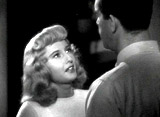 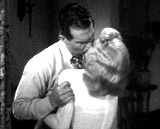 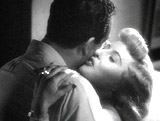 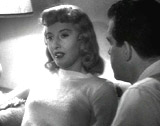 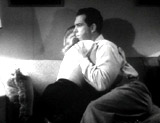 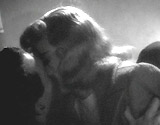 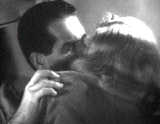 |
|||||||||
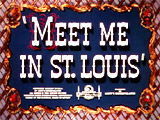
|
MGM's classic and nostalgic, turn-of-the-century musical by director Vincente Minnelli, told of the romantic yearnings and tribulations within a single family, the Smiths, who lived in 1903 St. Louis. Young Esther Smith (Judy Garland) rushed to her next-door neighbor John Truett's (John Drake) house, where she defended her precocious younger sister Tootie's (Margaret O'Brien) alleged attack by him. Finding him on the front porch, she punched Truett, knocked him down, and bit him, as she exclaimed:
But when she realized John's intentions were good (Tootie had resisted when he wanted to hide her from police), Esther again rushed next door to John's front porch to reconcile with him. She was shown all his bruises, and humbly apologized: "I'm terribly sorry if I hurt you." She then thanked him for accepting: "It's awfully nice of you to accept my apology." He responded, light-heartedly:
As she was leaving, he requested that she help him turn out the lights in his house, and added: "I'm afraid of mice." After some more small-talk, he suddenly grabbed her by the arms and pulled her to himself. She finally received her first kiss from him, after which she was stunned, but able to retort:
|
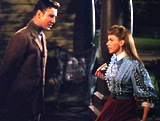 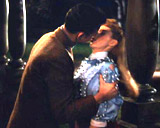 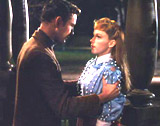
|
|||||||||
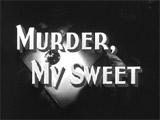
|
Director Edward Dmytryk's classic film noir mystery was a faithful adaptation of Raymond Chandler's 1940 novel Farewell, My Lovely, and featured the screen debut of LA detective Philip Marlowe. After being temporarily blinded by a gun being fired near his face in the film's conclusion, tough, incorruptible Philip Marlowe (Dick Powell) was escorted to a cab by Detective Nulty (Paul Phillips), with beautiful red-headed heiress Ann Grayle (Anne Shirley) with a mink coat silently following behind. Unaware that she was present and listening, Marlowe praised her to Nulty: "Cute figure, huh?...She had more than a figure too...Not a beautiful face, but a good face. She had a face like a Sunday School picnic." When Marlowe climbed into the back seat of the cab, she silently joined him without his knowledge. When she brushed against him as the taxi lurched, he sniffed the air, and detected her perfume. After realizing that it wasn't Nulty who had entered the cab with him, Marlowe blandly asked:
Grinning, Ann eagerly kissed him without saying a word as the film faded to black -- but not before Marlowe prudently removed his gun from his holster in his top pocket to avoid bruising her. |
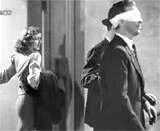 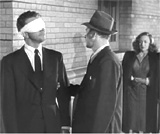 Exiting the Police Station, With Ann Silently Following Behind 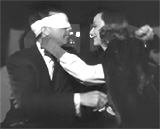 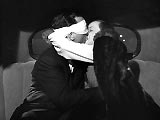 Perfume-Wearing Ann Grayle and Marlowe Kissing in Back Seat of Taxi |
|||||||||
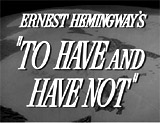
|
Warners' and director Howard Hawks teamed to present this post-Casablanca romance based loosely on a Hemingway novel, with the first pairing of "Bogie" and "Bacall." [Their on-screen and off-screen affair sizzled during the film, and they ended up getting married and living together until Bogart's death in 1957.]
Both happened to meet during World War II in French Martinique, and their first encounter was notable for her sultry proposition. The young and stranded American Marie appeared in the hallway-doorway of his upstairs room in the Marquis Hotel above the nightclub. She had come from her rented room across the hall. In her first husky, sexy lines to him as she leaned in, she made a simple, deadpan request for a match, but it sounded like an erotic challenge: "Anybody got a match?" Later, at the beginning of one of the screen's most famous seductions, she appeared at his room's door for another visit, this time with a liquor bottle in her hand. After a lengthy conversation, she said in a husky drawl:
As she pulled back, he asked: "What'd you do that for?" She answered his question about why she had found herself on his lap and kissed him, and then he wanted to know her reaction:
She described to her less-than passive partner that the second kiss was better than the first:
She then suggested as she left his room, speaking in a low purring voice:
|
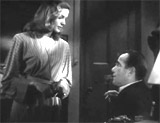 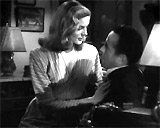 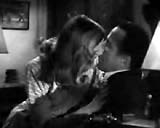 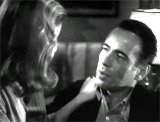   
|
|||||||||
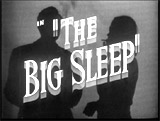
|
Director Howard Hawks' complex yet faithful adaptation of Raymond Chandler's novel was a classic who-dun-it film noir with a very tangled plot. As LA private detective Philip Marlowe (Humphrey Bogart) drove away from gangster Eddie Mars' (John Ridgely) casino with alluring Vivian Rutledge/Sternwood (Lauren Bacall), they had an opportunity to stop by the side of the road and kiss each other amidst the dark intrigue:
Marlowe continued with his detective-questioning:
His continuing line of questioning angered her. |
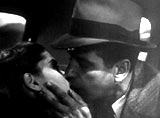 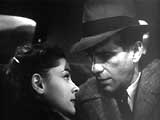
|
|||||||||
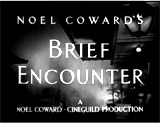
|
Director David Lean's British romance told of a brief platonic affair between a conventionally-married British housewife and a doctor:
In the dark, shadowy underground subway tunnel-passage of the train station, she succumbed to their first kiss (after he told her: "I love you so"). As they passionately kissed for the first time, two large, long shadows of approaching passengers darkened the tunnel's wall behind them, a newspaper swirled in front of them, and the roar of the approaching train was heard. The forceful speed of the noisy train represented their passion rising and crashing through the silence. Later, in a memorable scene on their sixth of seven Thursday secret meetings - Alec and Laura took a ride into the country in a borrowed car, and visited a stone bridge. They stood together and chatted about their clandestine relationship:
At the end of the day after returning, they again stood in the train tunnel and kissed as a train roared through. Although Laura rushed off to her train, she reconsidered and joined Alec in a borrowed apartment, but the couple were interrupted after kissing and never stayed the night. They finished their clandestine, forbidden affair with a final cup of tea and a brief and painful parting. This tea room scene was played out a second time (the first time was at the beginning of the film), but this time from the perspective of Laura's subjective memory. They sat at a table - the camera closely centered on them as they had their last intimate conversation together, but were interrupted by matronly gossip Dolly Messiter's (Everley Gregg) loud voice. When Alec's train arrived, although they longed to kiss each other, Alec stated: "I must go. Goodbye." He rose and shook hands with Dolly and then rested his hand lightly on Laura's right shoulder for a moment, before his final departure. Dolly spoiled their final few, painful moments together, forcing their farewell to be brief and offhandedly deceptive - WITHOUT a farewell kiss. |
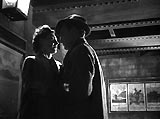 In the tunnel (first time) 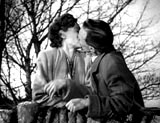 In the country 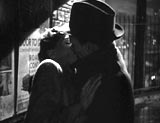 In the tunnel (second time) 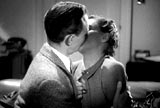 In the apartment 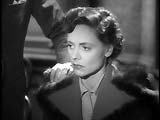 Final Tea Room Farewell Scene |
|||||||||
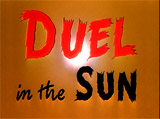
|
Producer/writer David O. Selznick and director King Vidor teamed to present this epic western (nicknamed "Lust in the Dust"), a lustful and grandiose motion picture featuring two loving combatants:
Earlier scenes showed Lewt forcefully kissing a resistant Pearl. After she fought him off, he told her:
It was a passionate love-making scene accompanied by thunder and bolts of lightning, and kisses for the "bob-tailed little treecat." |
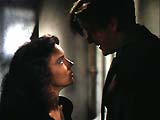 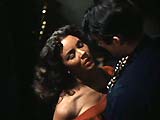 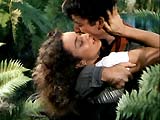
|
|||||||||

|
A final notorious, and infamous show-down scene at the film's end was the climax of all the confrontations between the two of them. When Lewt (Gregory Peck) appeared in the rocks at a long distance from her, Pearl (Jennifer Jones) took aim and shot her lover, to end their passionate love-hate affair. She showed immediate remorse, thinking he was dead. But he was still alive, although wounded in the leg. He fired back, calling her a "double-crossin' bobcat." Pearl was still drawn to him, re-cocking her gun and moving forward. As she approached, Lewt shot Pearl in the chest, sending her bloodied body into the rocks and rubble. Satisfied that he had killed her, he said to himself: "I guess that does it," but then felt twinges of regret that he had shot his beloved, calling out "Pearl, hey Pearl!" The ex-lovers continued their bloody shoot-out in the hot desert sun and Lewt was shot in the stomach, and he told her: "I can't shoot no more, honey. Honest." Seriously wounded, she dragged herself over the rocks and up the side of the mountain toward her dying lover, while spouting blood and shouting threats ("I'm not scared of you. I'm coming up after you"). Dying, Lewt asked Pearl:
In their final moments, she cried out for him: "Lewt, hold on Lewt, Hold on. Wait for me, Lewt," and lustfully crawled toward him, as she slid back with her grasp of sand. When she finally reached him, they stretched their hands out toward each other: Lewt: "You always said you could shoot. I never believed ya."
They bloodily embraced and died in the dust in each other's arms. As they died, the camera pulled back until they were lost in the landscape under the blazing, hot sun, under the massive face of Squaw's Head Rock. |
 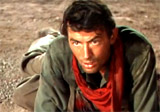 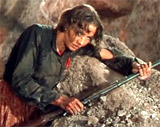 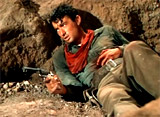
|
|||||||||
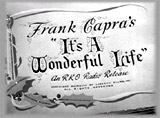
|
RKO's and director Frank Capra's tearjerking Christmas tale (adapted from Philip Van Doren Stern's "The Greatest Gift") was about a small-town banker in Bedford Falls who was driven to the brink of suicide by a wealthy and mean elderly banker. Earlier in the film, George Bailey (James Stewart) was having a phone conversation with friend Sam Wainwright (Frank Albertson) while his hometown sweetheart Mary (Donna Reed) was also squeezed together next to him to share the same earpiece extension. As they were listening and talking on the same phone, his romantic attraction to her was undeniable with this close proximity, but such an admission would mean remaining in Bedford Falls, where he had been forced to stay against his will and give up his other dreams. In a long closeup of them ear to ear with the phone between them, they listened to Sam while George squirmed and tried to contain himself, standing so close that he could smell Mary's hair. She looked upward at him and with her lips almost on his lips reinforced what Sam has said in a whisper, but she was almost unable to say the words: "He says it's the chance of a lifetime." The phone suddenly dropped to the floor, and instead of grabbing and embracing Mary with a kiss, George held her fiercely by the shoulders and violently started shaking her, passionately protesting that he didn't want to get married:
Then, he ran out of words. She responded by crying helplessly, silently, and then the conflicted George all of a sudden reversed himself and pulled Mary to himself in a fierce and passionate embrace. He overcame his resistance to her and started to kiss her all over her upturned face, holding her intensely. Their undeclared love for each other overwhelmed both of them. After a quick cut, the next scene was in the hallway of the Bailey house and the sound of the Wedding March. |
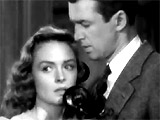 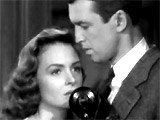 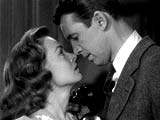 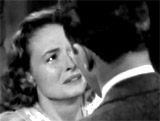 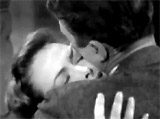 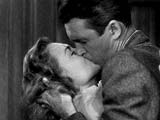
|
|||||||||
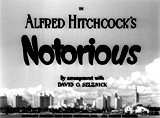
|
This Hitchcock spy thriller included suspense, intrigue, plot twists, and also at the time of its production 'the longest kiss in film history.' It was able to circumvent censorship (no kiss could be longer than three seconds) by having the kisses composed of lots of pecks and necking, alternated and interspersed with whispers of discussion. The famous marathon kissing scene, almost three minutes in length, was a romantic interlude between two of the film's main characters:
It began on a scenic Rio de Janeiro hotel balcony over the beach in Alicia's apartment, and was entirely shot in a tight closeup of their faces. They rapidly alternated passionate, clinging kisses and whispered endearments, and then continued with nibbling bites and nuzzling hugs as they walked from the balcony to the telephone (where he engaged in a conversation) and then to the front door.
During part of their conversation when he was dialing the telephone (calling his hotel for his messages), Alicia told him: "This is a very strange love affair" - and he asked why as she kissed him. Then she replied: "Maybe the fact that you don't love me." After connecting with the hotel, he responded as he kissed her: "When I don't love you, I'll let you know." When she further stated: "You haven't said anything," he told her: "Actions speak louder than words." |
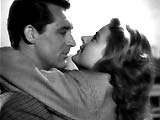 |
|||||||||
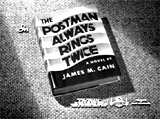
|
The Postman Always Rings Twice (1946)
MGM's and director Tay Garnett's film noir, set in the post-war era, sizzled the screen with this adaptation of another James M. Cain novel. The steamy melodrama was fueled by the appearance of its two main stars with tremendous chemistry:
After Cora's dramatic entrance into the cafe (sexily clad in white shorts, a halter and turban), she and hired worker Frank officially met and spoke for the first time. She began bossing and sizing him up while he made suggestive advances towards the untouchable yet glamorous woman. Suddenly, Frank grabbed her and planted a kiss on her lips. She reacted with great poise - she pulled out her vanity mirror, cleaned up the smudged lipstick on her lips, and then reapplied the lipstick before leaving - without a word. Soon, after a moonlight swim, they would be sharing more furtive, passionate and intimate kisses. In this film noir's finale, as the star-crossed lovers were driving along the highway and near their home after they had reaffirmed their love (and eliminated her husband), Frank asked for a long-awaited kiss. Cora, who was painting her lips with lipstick, promised: "When we get home, Frank, then there'll be kisses, kisses with dreams in them. Kisses that come from life, not death." He responded: "I hope I don't wait." She replied lovingly: "Darling" and then they kissed, but she soon cried out frantically: "Look out, Frank!"
Distracted during a 'kiss that comes from life' while he was driving, he ran off the road, killing Cora ('with a kiss that comes from death') in a fatal auto accident. |
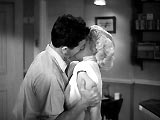 Frank Grabbing and Planting a Kiss on Cora's Lips 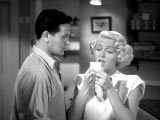 Cora Reapplying Her Lipstick 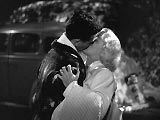 Furtive Kisses Between the Two Plotters |
|||||||||
(in chronological order by film title) Introduction | 1896-1925 | 1926-1927 | 1928-1932 | 1933-1936 | 1937-1939 | 1940-1941 1942-1943 | 1944-1946 | 1947-1951 | 1952-1954 | 1955 - 1 | 1955 - 2 | 1956-1958 | 1959-1961 1962-1965 | 1966-1968 | 1969-1971 | 1972-1976 | 1977-1981 | 1982 1983-1984 | 1985-1986 | 1987 | 1988 | 1989-1990 | 1991 | 1992-1993 | 1994 1995 | 1996 | 1997 | 1998 | 1999 | 2000 | 2001 | 2002 | 2003 | 2004 | 2005 | 2006-2007 | 2008 | 2009- |